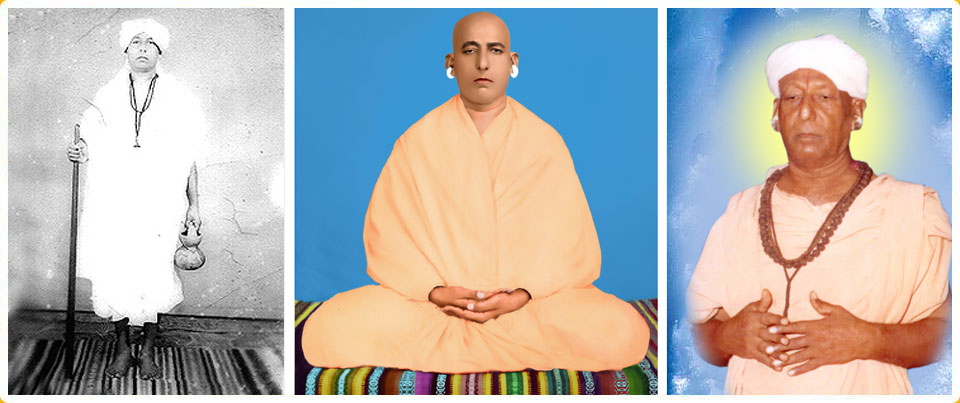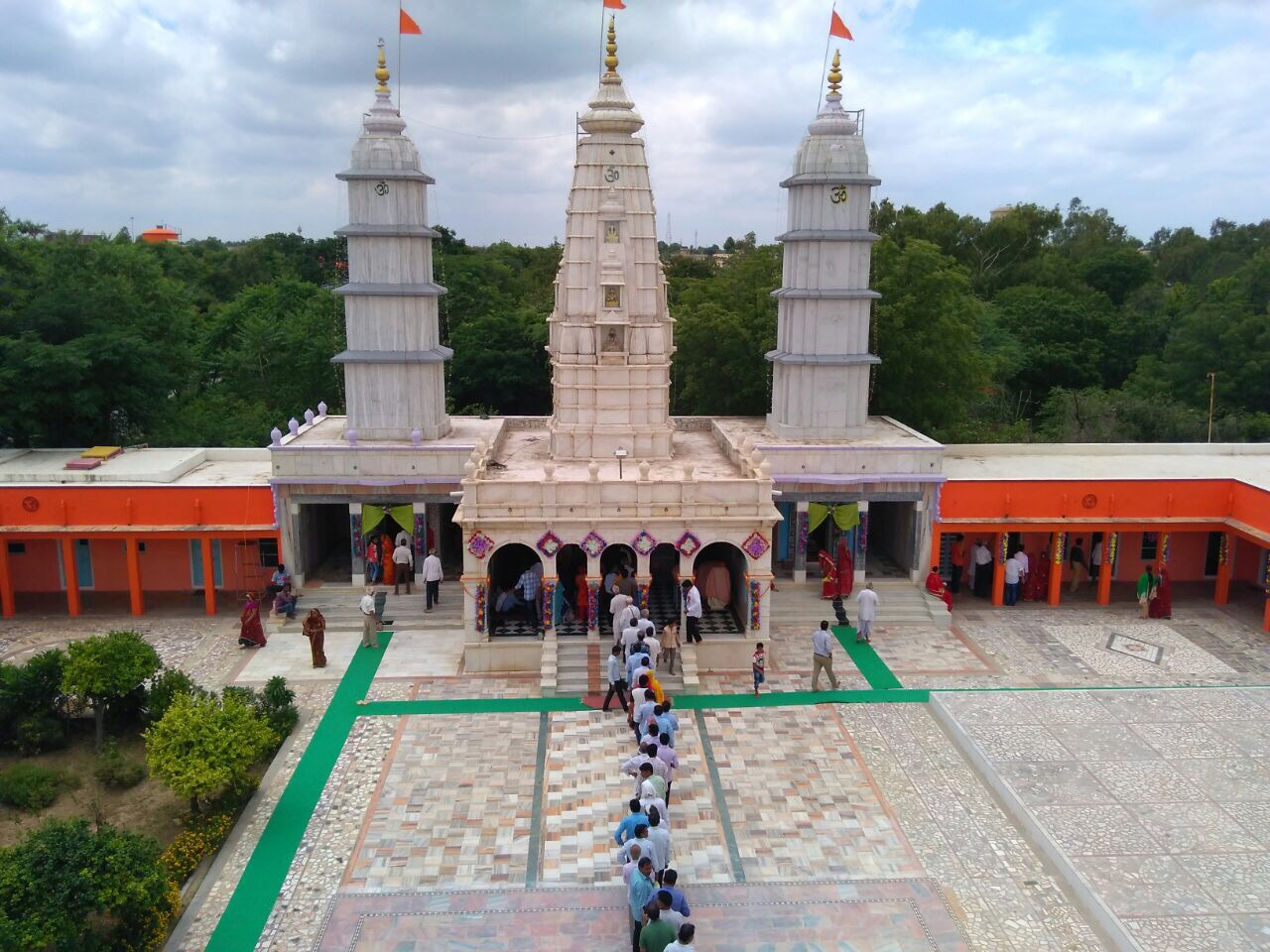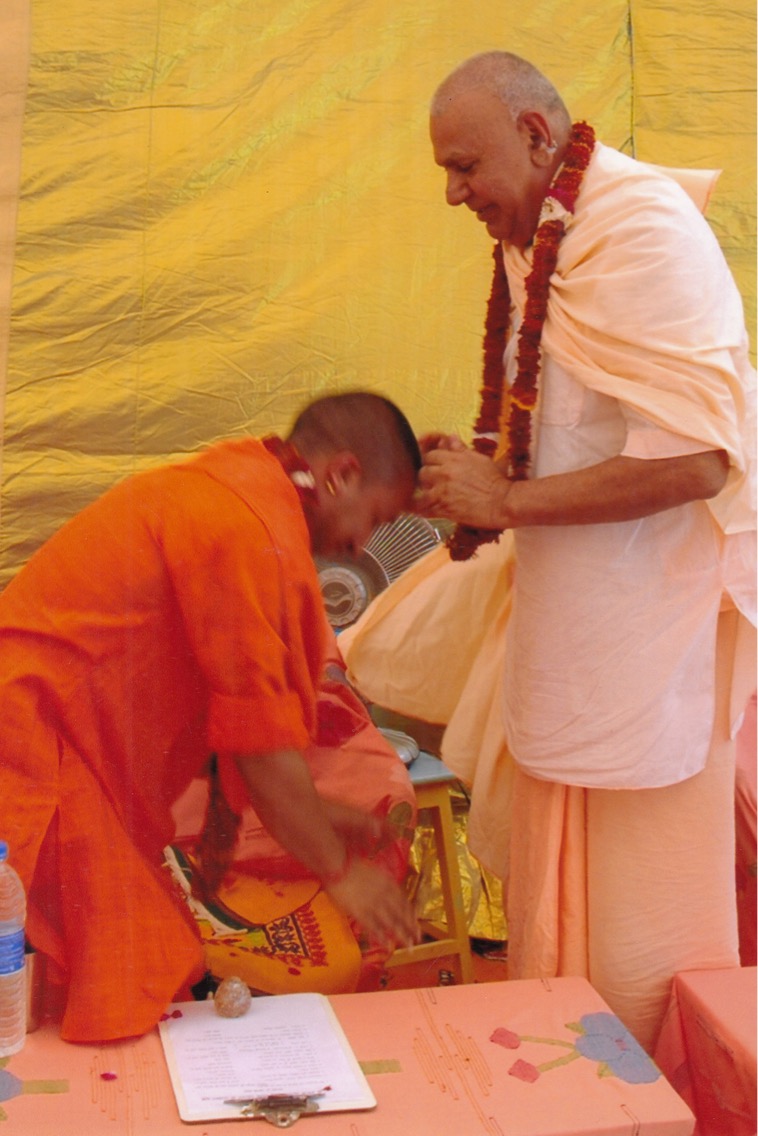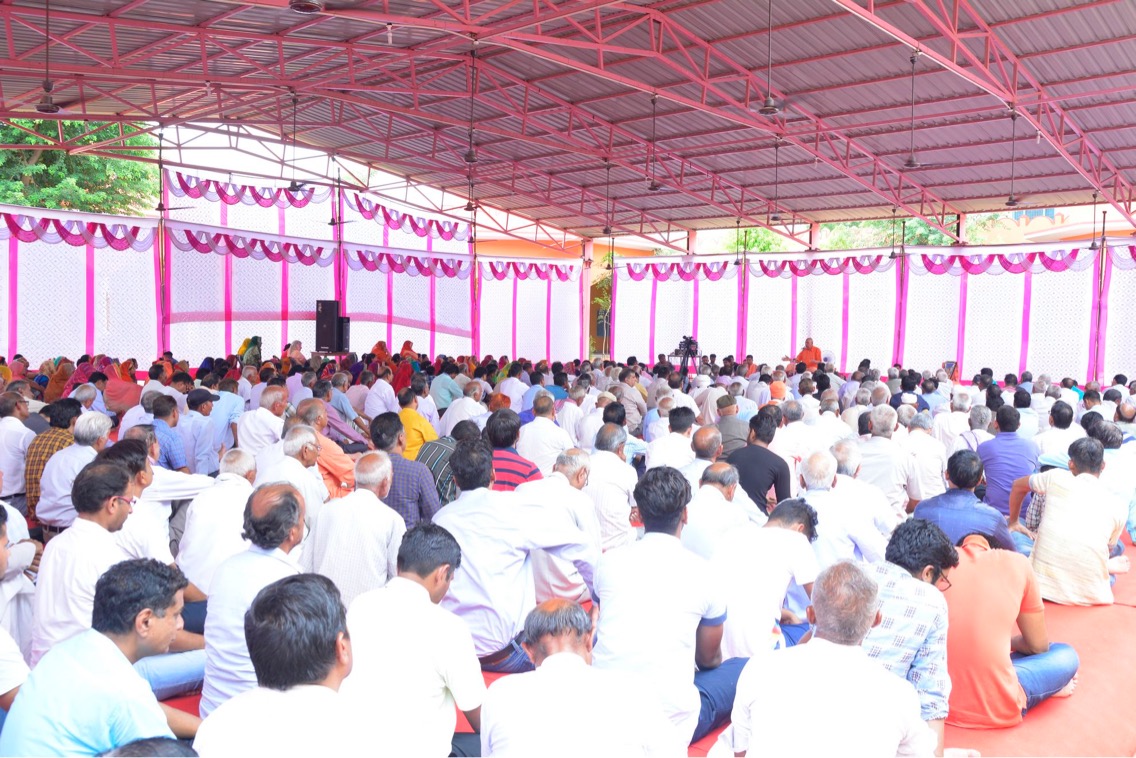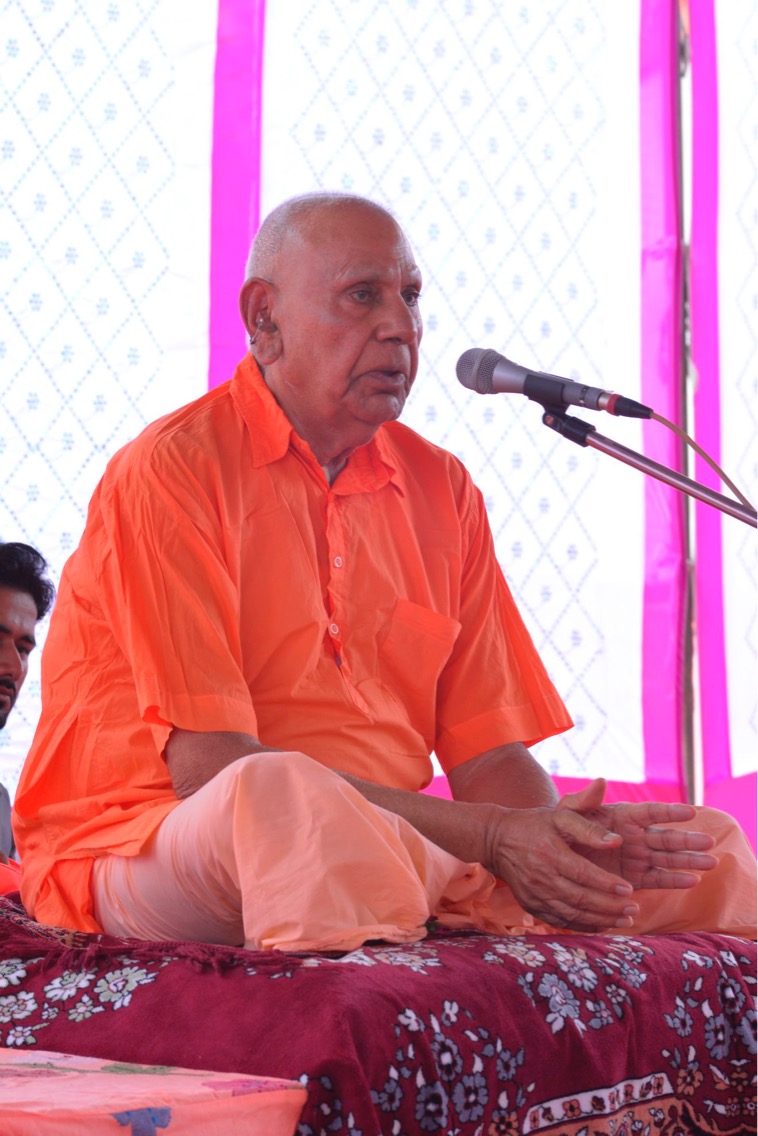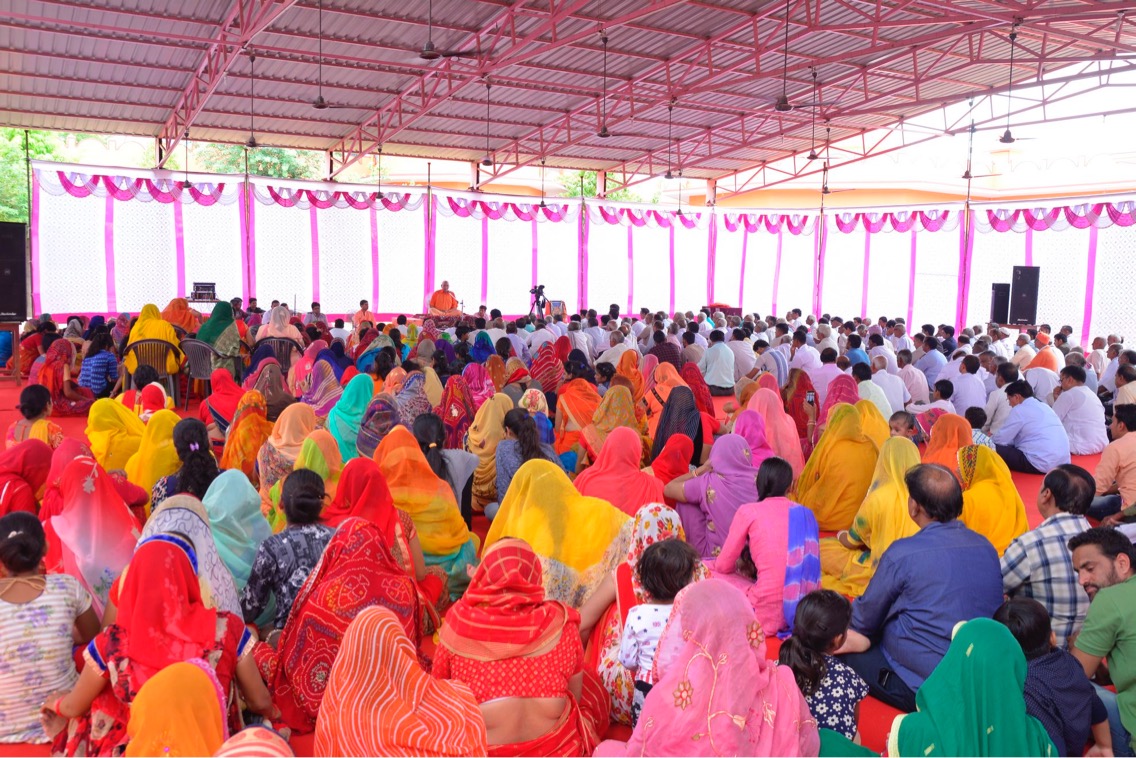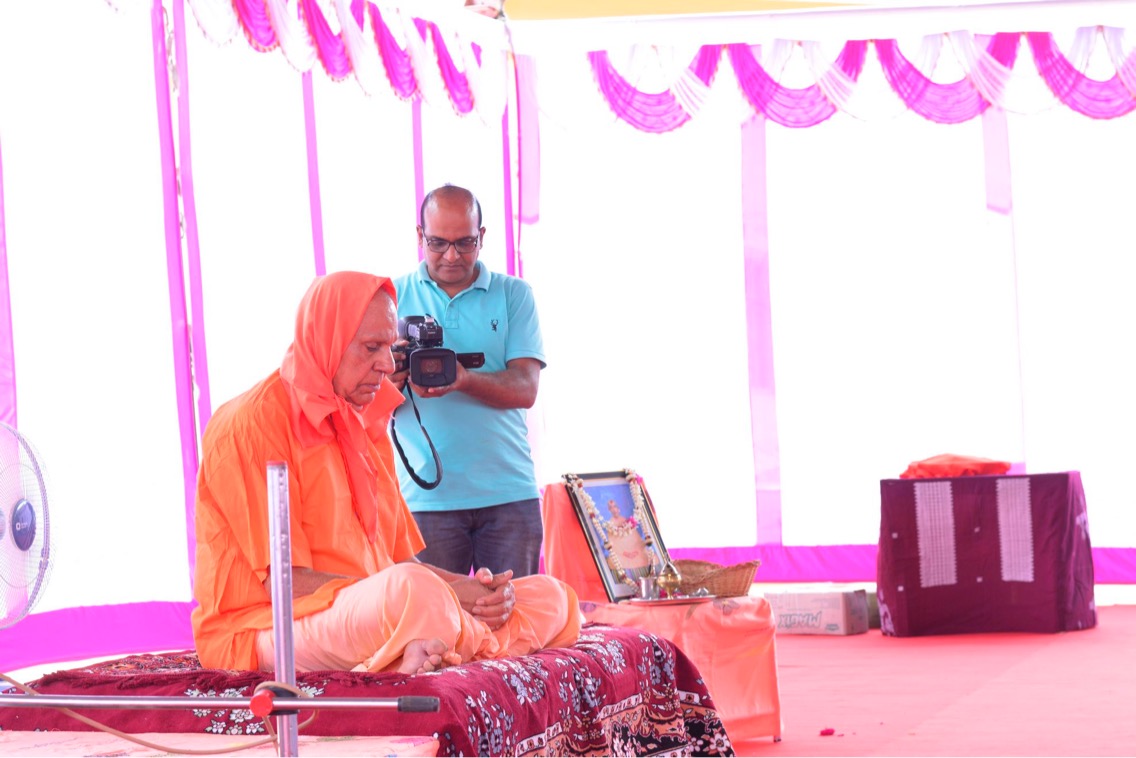


From Man to God
From Shraddha (faith) to Shraddhanath
Our India is the country where the possibility of man rising to
the stature of god has continued to be transformed into reality. The
people of other countries have taken scientific experiments and
mechanical inventions as proof of the greatness of man. But it is
the yogis of India who have told mankind that scientific instruments
can provide only material comforts in this mortal world, whereas
life goes on even after death and man, therefore, must endeavour to
attain eternal happiness instead of transitory pleasures. It is not
in doubt that with this end in view in ancient times the sages of
India attained siddhis (superhuman capabilities) through their japa,
tapa (austerities) and yogic practices of various kinds.
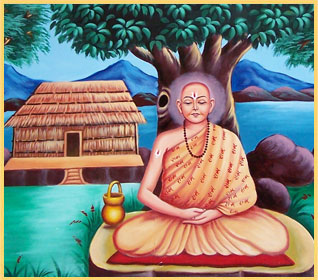 But even in
this science-dominated age of stark materialism the saints here,
accepting the practical system of yoga involving religious
austerities and ascetic practices as prescribed by their gurus
(spiritual guides), have manifested the attainment of godhead in
human frame, and through that divinity in man they have relieved the
sufferings of innumerable people in distress. Shri Shaddhanathji
Maharaj was a great yogi and an accomplished altruistic saint of
this very kind.
But even in
this science-dominated age of stark materialism the saints here,
accepting the practical system of yoga involving religious
austerities and ascetic practices as prescribed by their gurus
(spiritual guides), have manifested the attainment of godhead in
human frame, and through that divinity in man they have relieved the
sufferings of innumerable people in distress. Shri Shaddhanathji
Maharaj was a great yogi and an accomplished altruistic saint of
this very kind.The Indian sanatan Dharma (Hidnuism as involving the Shruties and Smrities i.e. the Vedas and the Hindu law books) is based on the theory of rebirth and previous births. Shrimadbhagavadgita and the Ramayana testify to previous birth and rebirth at several places. Lord Krishna says in verse 5 of chapter 4 In the Gita.
बहूनि में व्यतीतानि जन्मानि तव अर्जुन।
तान्यहं वेद सर्वाणि न त्वं वेत्य परंतप।।
तान्यहं वेद सर्वाणि न त्वं वेत्य परंतप।।
जातस्य हि धु्रवो मृत्युध्रुवं जन्म मृतस्य च।
तस्मादपरिहार्येऽर्थे न त्वं शोचितुमर्हसि।।
तस्मादपरिहार्येऽर्थे न त्वं शोचितुमर्हसि।।
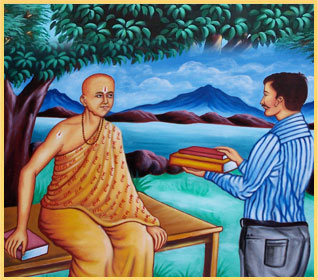
Rebirth and previous birth have been mentioned here for
the reason that it had become widely known about Shri Shraddhanathji
Maharaj that he was a saint of several previous births. In the birth
immediately before the present one he was the holy ascetic wearing a
red tilak (an auspicious mark on the forehead) engaged in religious
austerities in a hermitage situated on the bank of the River Jhelum
in Punjab. It was that tilak wearing Baba (ascetic) who incarnated
as Shri Shraddhanathji. He was born in Panlawa village in Tehsil
Lachhmangarh of Sikar District in Rajasthan on the second day of the
moonlit fortnight in the month of Ashadh, Vikram era 1975 (The
Vikram era is about 56 years a months ahead of the christian era. It
is written as 'samvat' in Hindu.) (about June-July 1918 A.D.) When
he was just a child he left home and embarked on a career of
religious austerities and yoga, because he had to continue the yoga
practice of his previous birth and go forward in it. In this regard
the Gita (verses 42 and 43 of chapter 6) says:
अथवा योगिनामेव कुले भवति धीमताम्।
एतद्धि दुर्लभतरं लोके जन्म यदीदृशम्ं।।
तंत्र तं बुद्धि संयोग लभते पौर्वदेहिकम्।
यतते य ततो भूयः संसिद्धौ कुर, नन्दन।
(Or (if he has develop dispassion) he may he born in the family of
enlightened yogis; but this Kind of birth is very difficult to
obtain in this world. Arjuna, there he regains the understanding of
his previous birth (i.e. the latencies of the yoga of even
mindedness are roused in him); and through that he strives with
greater vigour than before, for perfection (in the form of God
realization))
Likewise, Shri Shraddhanathji Maharaj left home when he was still a
boy and set out on the path of spiritual practices, austere
asceticisim and yoga. By virtue of his unfathomable faith,
unflinching devotion and firm resolve he went on advancing on that
path. In the company of accomplished.
Saints and great yogis he knew and learnt deep secrets of yoga and
put them into practice in his own life. Although he formally
renounced the world, i.e. became an ascetic at the age of 36 years
on the thirteenth day of the moonlit fortnight in the month of
paush, samvat 2011, he had already acquired all the yogic powers
before that. He was capable of relieving the sufferings of devotees
who took refuge in him and actually did so through the yogic powers
at his command. Before he accepted sannyas (renunciation) his
secular or worldly name was Narayan. On duly initiating him into
sannyas, his guru had said to him:
एतद्धि दुर्लभतरं लोके जन्म यदीदृशम्ं।।
तंत्र तं बुद्धि संयोग लभते पौर्वदेहिकम्।
यतते य ततो भूयः संसिद्धौ कुर, नन्दन।
नारायण से श्रृद्धा, श्रृद्धा से श्रृद्धानाथ।
योगी बनकर साधना, श्रृद्धा रखना साथ।।
(The person named Narayan set out on his spiritual path with
unfathomable faith in God and sadguru (true and virtuous spisitual
guide). That faith has made him Shraddhanath (a Nath Yogi full of
faith). He is now to keep up his faith, be a true yogi and achieve
his goal)
Shri Shraddhanathji Maharaj always followed this precept of his
initiating guru and by virtue of his faith reached the summit of
greatness. Lord Krishna says in the Gita (4.39):
योगी बनकर साधना, श्रृद्धा रखना साथ।।
श्रद्धावाँल्लभते ज्ञानं तत्परः संमतेन्द्रियः।
ज्ञानं लब्ध्वा परां शान्तिभचिरेणाधिगच्छति।।
ज्ञानं लब्ध्वा परां शान्तिभचिरेणाधिगच्छति।।
मरो हे जोगी मरो, मरो, मरण है मीठा।
तिस भरणी भरो, जिस भरणी भरे गोरव दीठा।
तिस भरणी भरो, जिस भरणी भरे गोरव दीठा।
Arguments and counter - arguments keep one oscillating between belief and scepticism. But when all the arguments are exhausted, are shattered to pieces and fail, that is when faith is born. For example, when the scourge of secorching heat in summer continues a bit too long and people begin to cry repeatedly for help with their eyes and both their hands raised towards the sky, entreating God to do something to save them, His grace rains from the heavens in the form of water. God wants nothing from us. He wants only devotion, only faith in him. He wants this Jeva (being), who is his own portion, to call to him just once helplessly and piteously from the bottom of his heart. So long as you are possessed of the arrogance of office, power or pelf, God well not come to your aid. He comes to help a helpless devotee who is full of faith. Draupadi (in the Mahabharata) was confident of the might of her five husbands. She also trusted in Bhishma, the glorious granduncle of the Kauravas and Pandavas both, and was confident that these people would save her from the clutches of Duhshasan, who had been commanded by Duryodhan to take her clothes away in the open assembly. But her confidence was shattered to pieces. She became helpless in every way. Then faith arose in her heart and she called to the lord for help and lord Krishna came to her rescue without even a moment's delay. Likewise, the leader of a herd of elephants was also confident of his own physical strength and that of his herd. But a crocodile seized him by the leg near the bank of a river and started dragging him into deep water. When his own physical might and the might of his herd was all exhausted and failed him and he was utterly helpless, faith arose in his heart and he piteously called out to god for help. Didn't then the Lord came to his aid without delay (in a story from the Bhagavata purana)?
Faith is born in a helpless person. The moment a devotee finds himself utterly helpless and entrusts himself to God, thinking that he himself cannot do anything now, that his own efforts can't help him reach the Lord, that there is a limit to what his own efforts can achieve and they cannot take him to the limitless, i.e. the Lord, he entreats the Lord to cradle him in his caring arms. Only a person who has lost all hope, who is tired out and dejected takes refuge at the Lord's feet with sincere faith. When one feels in one's heart of hearts that god alone in all with faith as your support you cannot go wrong because you have left everything to that kind Lord.
Faith and mystery are also closely related to each other. Only he who comes to perceive this life and creation as something mystical makes progress in the path of God- realization. Let us see what the Gita says about such a great person. Lord Krishna says in the Gita (2.29):
आश्रचर्यवत् पश्यति कश्रिदेनमाश्रचर्यवद्वदति तथैव चान्यः।
आश्रचर्यव श्रैनमन्यः श्रृणोति श्रुत्वाप्येनं वेद न चैव कश्रिचत्।।
आश्रचर्यव श्रैनमन्यः श्रृणोति श्रुत्वाप्येनं वेद न चैव कश्रिचत्।।
अथवा बहुनैतेन किं ज्ञातेन तवार्जुन।
विष्टयाहमिदं कृत्स्नमेकांशेन स्थितो जगत्
विष्टयाहमिदं कृत्स्नमेकांशेन स्थितो जगत्
This statement of Shri Krishna's not only reveals a very important secret of nature, it also tells us about god's unique and unlimited power of Yoga. The yogic powers of saints are, in fact, the yogic power of God himself. By virtue of their belief, faith, devation and prolonged practice of japa, tapa, diverse, forms of yogic acts and spiritual disciplines, saints come into direct touch with god and they become, in a way, models of God. Accomplished yogi saints are even capable of doing things that God can do, But saints don't interfare in the operations of the low of Providence, because
कर्मप्रधान विष्व रचि राखा।
जो जस करहि, सो तस फल चाखा।।
i.e. The Lord has made the low of Karma (action, deeds) a
predominant phenomenon of his creation and one reaps the fruits of
one's own deeds, good or bad, as the case may be, But to save one
self from the dire difficulties caused by one's evil deeds, the Lord
has pointed out the course of seeking refuge in Him. At the same
time the Lord has given the assurance that he never spurns a
shelter-seeker, provided he selects which of his wrongdoings have
resulted in his tribulations, is penitent and resolves to refrain
from evil deeds and to do what is morally right and good to do. Shri
Krishna says in the gita that in times of crises, ailments etc. man
should ponder over his faults and sins.
जो जस करहि, सो तस फल चाखा।।
Similarly, Shri Shraddhanath ji Maharaj never spurned any shelter-seeker. He would relieve the sufferings of the person who took refuge in him. By spending his powers derived from spiritual disciplines and ascetic practices. But at the same time he would also persuade the person to sin no more and do no more wrong. He used to say that he would help even the most sinful of people if he sought refuge provided he vowed to tread the path of self-improvement . Shri Krishna says approximately the same thing in the gita (4.36):
अपि चेदसि पापेभ्यः सर्वेभ्यः पापकृत्तमः।
सर्वं ज्ञानप्लवेनैव वृजिनं संतरिष्यसि।।
सर्वं ज्ञानप्लवेनैव वृजिनं संतरिष्यसि।।
In this verse and at several other places in the gita Shri Krishna has said clearly that even if the most sinful of all sinners takes refuge in Him, He makes him, His own and helps him cross over the sea of sin by the raft of Knowledge. Similarly, Shri Sharddhanath ji Maharaj not only relieved thousands of people of their sufferings but also made them take the road to self-improvement. That is a great deed as well as a service to the creation, the country, the society and mankind. He had incarnated to work for summum bonum, (the highest or sublime good), altruism, the good of others, as has been said to:
तरूवर फल नहीं खात हैं, नही न संचे नीर।
परमारथ के कारणै, साधु धर्यों शरीर।।
परमारथ के कारणै, साधु धर्यों शरीर।।
